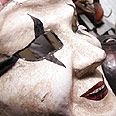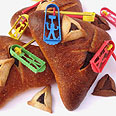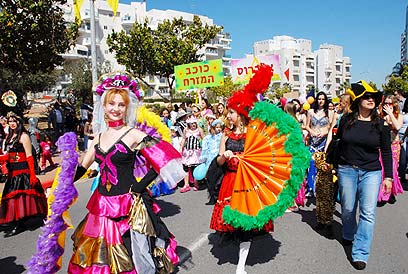


Often referred to as the "Jewish Halloween", Purim is the Jewish holiday that commemorates the deliverance of the Jews of Persia from a massacre planned against them. It falls on the 14th day of the Jewish month of Adar, which is usually in March, and one month before Passover.
The origin of the name comes from the Hebrew word "Pur", meaning fate or the casting ones fate; and although having some religious significance, Purim – like Chanukah – carries more of a national, traditional meaning than a religious one.
Purim has four main mitzvahs: The reading of the Book of Ester, giving food gifts to friends (known as Purim packages), giving the gift of charity and holding a Purim meal.
The Book of Ester – the Megilla – tells the story of a series of seemingly random events taking place over a nine- year period during the rule of King Ahasuerus of ancient Babylon.
According to Talmudic interpretation, there acts put together are considering feats of divine intervention.
The book tells the story of a conspiracy by King Ahasuerus' prime minister, Haman, to eliminate the entire Jewish community in the kingdom.

A traditional Purim parade (Photo courtesy of the Ashkelon Municipality)
In the beginning of the story, Ahasuerus is married to Vashti, who he sends into exile after she refuses one his wishes. Mordecai, the leader of the Jewish community and one of the men, "sitting in the king's gate," offers he take his cousin Esther for his new wife.
Meanwhile, Haman and his wife Zeresh plot to have the king kill all the Jews, without knowing their new queen is Jewish herself. After learning of the impending catastrophe, Esther saves the day by telling the king of her true origin – some would say at great risk to her own safety – and of the conspiracy in court.
Furious by the betrayal, Ahasuerus orders Haman and his sons be hanged and names Mordecai prime minister in Haman's place.
During the religious service of reading the megilla in the synagogue, and whenever Haman's name is mentioned, it is customary for listeners to boo, hiss, and rattle noisemakers in an effort to blot out his name.
To mark the holiday, Jews are commanded to eat, drink and be merry, even to the point of becoming drunk. The holiday carries a few folk favorites, such as wearing costumes, holding parades and eating special pastry called Hamentashen, which are triangular fruit-filled cookies.














